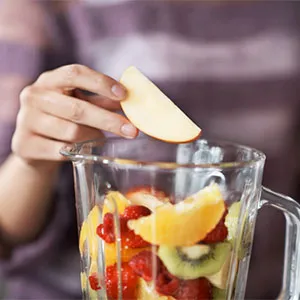When most people think about orthodontic treatment, they focus on braces, aligners, and retainers. But did you know that what you eat plays a big role in how successful your treatment is? A well-balanced diet can support strong teeth, reduce inflammation, and promote faster healing, while poor nutrition can slow down progress and even cause damage to braces or aligners.
At Robert Stoner Orthodontics, we want every patient to get the best results from their treatment. Whether you have braces or Invisalign, the right foods can make a difference in your comfort, oral health, and overall success. Let’s take a look at how nutrition impacts orthodontic treatment and which foods help or hinder your journey to a perfect smile.
How Nutrition Affects Orthodontic Treatment
Orthodontic treatment is a long-term investment in your smile, and the right nutrients can help ensure strong, healthy teeth and gums. Here’s how nutrition plays a role in treatment success:
- Stronger Teeth & Bones – Vitamins and minerals like calcium, vitamin D, and phosphorus help maintain strong enamel and bone structure, which is crucial when teeth are shifting.
- Faster Healing – Orthodontic adjustments may cause minor discomfort. Nutrients like vitamin C and zinc help with tissue repair and reduce inflammation.
- Lower Risk of Cavities – Braces create more places for food particles to hide, increasing the risk of cavities. Avoiding sugary and sticky foods helps prevent decay and keeps treatment on track.
- Protection Against Gum Disease – Healthy gums are essential for tooth movement. Nutrients like omega-3 fatty acids and vitamin A support gum health and reduce inflammation.
Now, let’s break down the best (and worst) foods for orthodontic treatment.
Foods That Help: What to Eat for Orthodontic Success
These braces– and aligner-friendly foods support oral health, strengthen teeth, and promote healing:
1. Dairy Products (Milk, Yogurt, Cheese)
- Rich in calcium and phosphorus, which help strengthen tooth enamel.
- Cheese is low in sugar and neutralizes acids that can cause cavities.
- Soft and easy to eat, making it ideal for sore teeth after adjustments.
Best Choices: Greek yogurt, cottage cheese, soft cheese slices, or a glass of milk.
2. Soft Fruits (Bananas, Berries, Avocados, Applesauce)
- Provide vitamin C, which helps heal gum tissue and fight infections.
- Less acidic than citrus fruits, reducing the risk of enamel erosion.
- Gentle on sensitive teeth, making them a great snack after braces adjustments.
Best Choices: Smoothies, mashed avocado, soft strawberries, or applesauce instead of whole apples.
3. Leafy Greens (Spinach, Kale, Lettuce)
- Packed with calcium, folic acid, and vitamin C, essential for healthy gums and bones.
- Low in sugar and naturally antibacterial, helping to protect against plaque buildup.
- Soft and easy to chew when cooked, making them braces-friendly.
Best Choices: Spinach in scrambled eggs, kale in smoothies, or soft lettuce in wraps.
4. Lean Proteins (Chicken, Fish, Eggs, Tofu)
- High in protein and phosphorus, both crucial for strong bones and teeth.
- Helps with tissue repair after adjustments or minor soreness.
- Less likely to get stuck in braces compared to tougher meats.
Best Choices: Soft grilled chicken, scrambled eggs, or flaky baked fish.
5. Whole Grains (Oatmeal, Whole Wheat Bread, Soft Rice)
- Provides fiber and B vitamins to support gum health.
- Less processed than white bread, which can stick to braces and cause decay.
- Soft and easy to eat, reducing stress on shifting teeth.
Best Choices: Oatmeal with honey, soft whole-grain pasta, or quinoa bowls.
Foods That Hinder: What to Avoid During Orthodontic Treatment
Certain foods can damage braces, increase cavity risk, or slow down treatment progress. Here’s what to watch out for:
1. Sticky & Chewy Foods (Caramel, Gummy Candy, Taffy)
- Can get stuck in braces, making them hard to clean.
- Puts pressure on brackets and wires, leading to potential damage.
- High in sugar, which increases the risk of tooth decay and gum inflammation.
Better Alternatives: Sugar-free pudding, soft dark chocolate, or yogurt-based treats.
2. Hard & Crunchy Foods (Popcorn, Nuts, Hard Candy, Ice Cubes)
- Can break brackets and wires, leading to emergency orthodontic visits.
- Small food particles (like popcorn kernels) can get lodged between teeth and braces.
- Excessive crunching can cause tooth pain, especially after an adjustment.
Better Alternatives: Soft granola, roasted chickpeas, or steamed vegetables.
3. Sugary & Acidic Drinks (Soda, Sports Drinks, Fruit Juices)
- High sugar content promotes plaque buildup, leading to cavities.
- Acidic drinks weaken enamel, increasing the risk of white spots on teeth.
- Can stain clear aligners, making them look cloudy or yellow over time.
Better Alternatives: Water, milk, or herbal teas. If you do drink something sugary, use a straw and rinse with water afterward.
4. Tough Meats & Chewy Breads (Beef Jerky, Steak, Bagels, Crusty Bread)
- Requires excessive chewing, which can cause discomfort.
- Can get stuck in braces, making them hard to clean.
- Puts strain on shifting teeth, leading to soreness.
Better Alternatives: Soft meats like ground turkey, shredded chicken, or steamed tofu.
Final Tips for a Healthy Orthodontic Diet
- Cut food into small pieces – This makes it easier to chew and prevents unnecessary stress on teeth.
- Rinse after eating – If you can’t brush immediately, rinse with water to remove food particles.
- Use a straw for acidic drinks – This reduces contact with teeth and minimizes enamel erosion.
- Stick to braces-friendly snacks – Soft fruits, yogurt, cheese, and smoothies are great choices.
Eating the right foods during orthodontic treatment not only protects your braces or aligners but also ensures that your teeth and gums stay healthy as they shift into their new positions. A balanced, braces-friendly diet helps you avoid unnecessary delays, reduces discomfort, and keeps your smile looking great.
At Robert Stoner Orthodontics, we’re committed to helping Greensboro patients achieve the best possible results from their orthodontic treatment. If you have any questions about diet, braces care, or Invisalign, we’re here to help!
